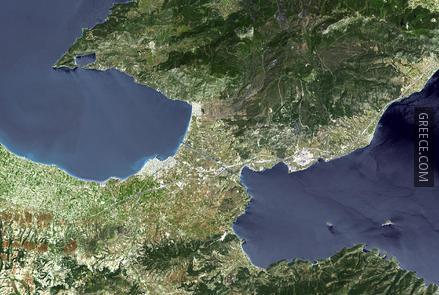General Information on Corinth
Modern Corinth is the administrative capital of Corinthia prefecture. It was rebuilt here after the old town was destroyed by an earthquake in 1858. This newer version of the Ancient City redeveloped along the coast, near the Corinth Canal which is the waterway connecting the Ionian to the Aegean. The town still capitalizes on its strategic position and rich waters. The waterfront in modern Corinth is one of the most attractive spots in the city. With numerous shops, restaurants, taverns, bars and nightclubs this is the liveliest part of the city. Despite the fact that the Modern Corinth is not traditional, it has a laid-back Greek-Mediterranean feel and is a great place for an overnight stay, due to its proximity to ancient Corinth and Nemea.
History of Corinth
According to Greek Mythology, Corinth was the place where Jason abandoned his wife Medea. Jason and the Argonauts were in search of the Golden Fleece. Their ship, after many adventures, brought them to the Kingdom of Aeetes. The king’s daughter, Medea, fell in love with Jason and helped him get the Fleece by giving him a magic potion which would double his strength for a day. Jason took the Fleece and fled back to Greece with Medea, whom he married. The couple arrived at Jason’s home town, Iolchos, but soon was ousted because of Medea’s witchcraft. They went to Corinth where Medea gave birth to two sons. However, Jason left her and married the young princess of Corinth. Medea, furious with Jason’s betrayal, killed the princess and her sons, and escaped Jason’s wrath by fleeing to Athens in a dragon-drawn chariot. Jason died of old age, next to his beloved ship Argos.
The ancient name of Corinth derives from a pre-Greek, “Pelasgian” language; it is believed that Corinth was also the site of a Bronze Age Mycenaean citadel, like Mycenae, Tiryns or Pylos. The city later became a great naval power and perfected the trireme. Corinthians were the first to think of creating a waterway through the Isthmus, but were unable to accomplish it. Instead, they invented and built a paved slipway called Diolkos, in order to haul their boats over the Isthmus. In classical times, the ancient city rivaled Athens and Thebes in wealth, thanks to isthmian traffic and trade. Until the mid-6th century, Corinth was a major exporter of black-figure pottery to cities around the Greek world. In the 7th century B.C., when Corinth was ruled by tyrants Cypselus and Periander, the city sent colonists to found new settlements. The city participated in the Persian Wars, but afterwards became an enemy of Athens and an ally of Sparta in the Peloponnesian League. In 431 B.C., one of the factors leading to the Peloponnesian War was the dispute between Corinth and Athens over the Corinthian colony of Corcyra. In 146 B.C. the Romans destroyed Corinth completely and the city was deserted. Julius Caesar rebuilt it as Colonia laus Iulia Corinthiensis in 44 B.C. and brought settlers from Rome. Under the Romans, Corinth became wealthy and luxurious with a large population of Romans, Greeks and Jews.
In 1212, the Franks took over the city until 1395, when the Byzantines captured it and sold it to the Knights of St. John five years later. In 1458 the city fell to the Turks and in 1612 it became property of the Knights of Malta. In 1687 it passed to the Venetians and was recaptured by the Turks in 1715. One year after the War of Independence, in 1822, the Ottomans were ousted and the city became part of the New Greek State. The canal became a reality in 1891-1893.
How to Reach Corinth
Coaches: Coaches to Athens (1½ hours) leave twice per hour from the KTEL Corinth bus station, Dimokratias 4, opposite the railway station. There are also buses to Ancient Corinth (20 minutes), Lecheon and to Nemea (1 hour). From the Argolis bus station on the corner of Aratou and Ethnikis Antistaseos streets, there are services to Argos (1 hour) and Nafplio (1¼ hours).
Train: There are several daily trains to Athens (1 ¾ hours), including intercity services. The Peloponnesian rail network splits in Corinth, with trains heading along the north coast to Diacofto, Patras and beyond.
Suburban railways (Proastiakos): There are about 7 daily trains that start at the Athens airport (El. Benizelos) and terminate in Corinth. The trip last 1 hour and 20 minutes and it is the easiest way of coming to Corinth.
Weather in Corinth
Corinth, much like the rest of Greece, has a warm Mediterranean climate. During summer, the weather tends to be hot and dry, but the usual seasonal winds relieve the sense of dryness. In addition, evenings are usually nice and cool.
Top 10 Destinations in Corinth
All Destinations in Corinth
Map of Corinth
 Athens Photos
Athens Photos
 Santorini Photos
Santorini Photos
 Crete Photos
Crete Photos
 Meteora Photos
Meteora Photos
 Corfu Photos
Corfu Photos








_-_Photo_by_Giovanni_Dall'Orto,_Nov_12_2009_160x80.jpg)
















